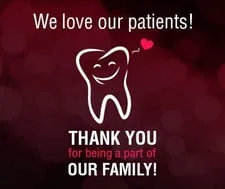Dentures today are made from very advanced materials designed to give you a natural appearance.
However, keep in mind that just like your teeth, dentures should be cared for with the same diligence. This means daily brushing and regular visits to your dentist.
Regular visits to your dentist are critical. Your dentist also can make minor adjustments that ensure that your dentures continue fitting naturally and comfortably.
Just like natural teeth, dentures need to be cleansed of plaque, food particles and other debris. Keeping your dentures in top shape will also help keep the soft tissues of your mouth healthy; an unclean or malformed denture can cause infections and irritation.
Cleaning Techniques
Remember to rinse and brush your dentures after every meal, and soak them in denture solution overnight. This also allows your gums to breathe while you sleep.
Here are some simple techniques for keeping your dentures clean:
- People can brush their dentures in a variety of ways. Some people use soap and water or a slightly abrasive toothpaste. Popular denture pastes and creams also can be used.
- Avoid using highly abrasive chemicals or pastes, or vigorously brushing with hard bristled toothbrushes. These can scratch or even crack dentures.
- Hold your dentures gently to avoid loosening a tooth.
- Clean your dentures with cool or tepid water over a water-filled sink. Hot water may warp a denture. A small washcloth placed in the bottom of the bowl will ensure that your denture isn't damaged if it falls.
- Soak your dentures overnight in any commercially available product like Efferdent or Polident, and remember to rinse your dentures before placing them back in your mouth.
- Remember to use a separate toothbrush to clean your own natural teeth, as well as all of your gum tissues. In lieu of a toothbrush, a soft washcloth may be used to wipe your gums.
Over time, even daily care of your dentures may require them to be cleaned by the dentist. A powerful ultrasonic cleaner may be used to remove hard accumulations of tartar and other substances.





